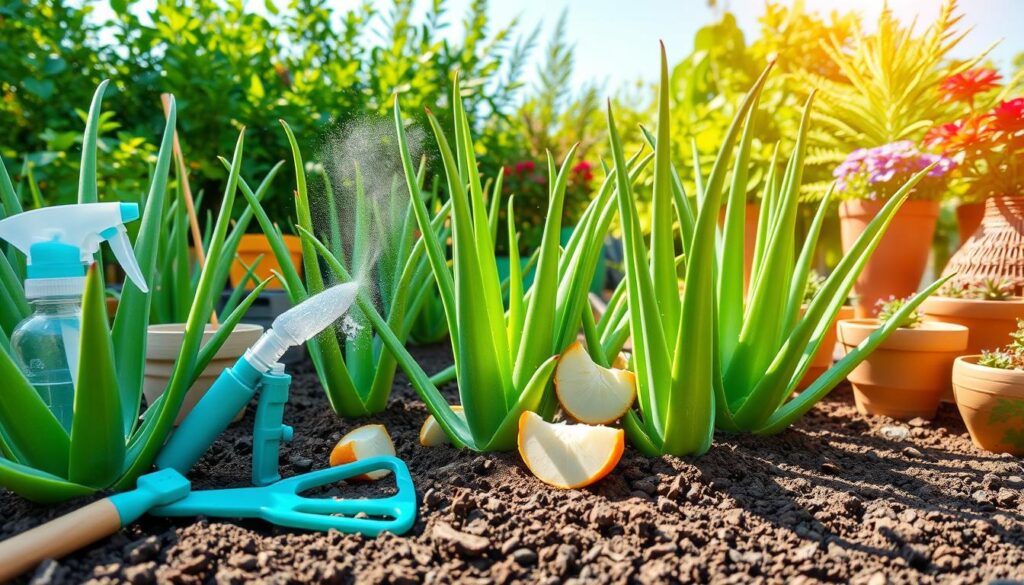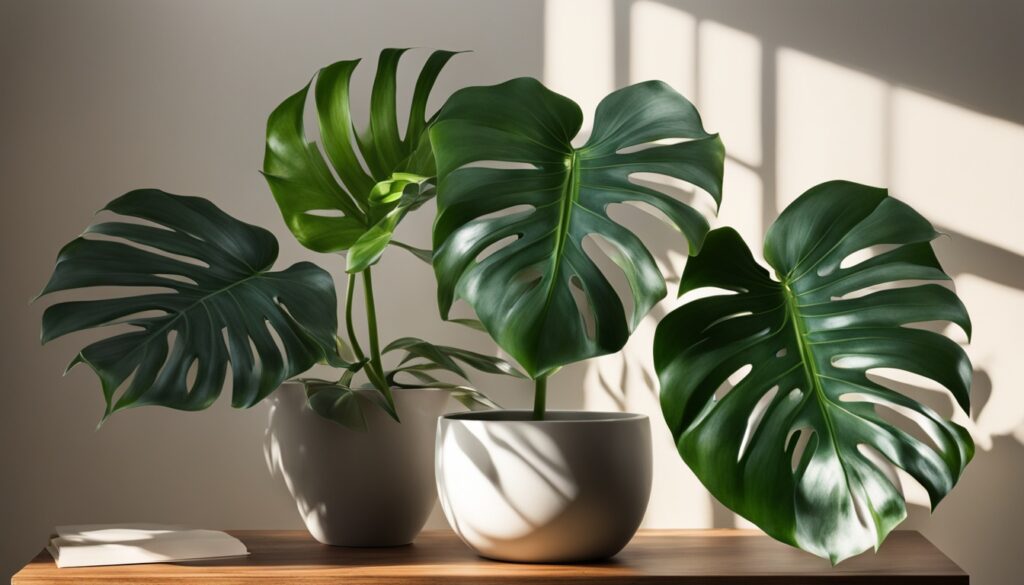Ready to grow a thriving aloe vera garden? Our guide shows you how to propagate aloe cuttings easily. Learn about the health benefits and beauty of aloe plants. Whether you’re new to plants or experienced, we make aloe propagation simple.
Key Takeaways
- Learn the easy steps to propagate aloe vera cuttings at home
- Understand the advantages of growing your own aloe plants
- Discover the optimal timing and techniques for successful aloe propagation
- Explore the various methods for multiplying your aloe plant collection
- Uncover the essentials for caring for newly propagated aloe plants
Introduction to Aloe Vera Propagation
Aloe vera is a tough and useful succulent plant. It has green leaves with sharp edges. Its gel is great for beauty and cooking. Growing more aloe vera plants is a fun way to enjoy its benefits.
Propagating aloe vera is easy, making it perfect for beginners and experts. You can grow new plants by dividing offshoots, using leaf cuttings, or seeds. Each method has its own benefits, letting you pick what works best for you.
Want more aloe vera plants? Want to share them with others? Growing your own is rewarding. We’ll cover the basics of aloe vera propagation next. You’ll learn how to grow more plants successfully.
“Aloe vera is one of the most versatile and beneficial plants you can grow, and propagating it is a rewarding way to enjoy its many uses.”
Benefits of Propagating Aloe Plants
Beyond its well-documented medicinal properties, the aloe vera plant has many benefits. It’s great for indoor or outdoor spaces. Propagating aloe plants lets you grow and share this versatile succulent easily.
Medicinal Properties
The gel inside aloe vera leaves is known for healing and soothing. It’s used in skincare products and home remedies. This makes aloe vera essential for natural solutions to skin issues and burns. Propagating aloe plants ensures you always have this beneficial plant on hand.
Aesthetic Appeal
Aloe plants have an attractive, sculptural look that can beautify any space. Their unique leaves and vibrant green color add elegance to your decor. Propagating aloe plants lets you grow and display this beautiful succulent, enhancing your environment’s look.
By propagating aloe plants, you enjoy their aloe vera medicinal properties and aloe vera aesthetic appeal. You can also share the aloe plant benefits with others. Propagation is a simple and rewarding way to spread the joy of these aloe plant benefits.
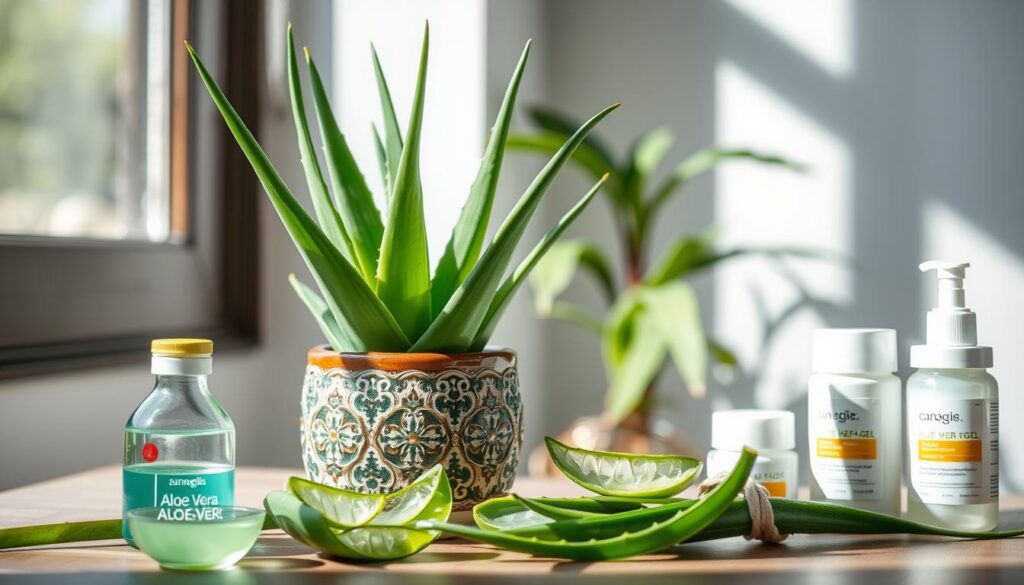
“Aloe vera is a remarkable plant that offers both practical and aesthetic value. Propagating it is a great way to ensure you can harness its aloe vera medicinal properties and aloe vera aesthetic appeal for years to come.”
Propagation Methods for Aloe Plants
Aloe plant lovers have many ways to grow more of these plants. You can propagate aloe vera and other types. Knowing the different methods helps you grow more of these beautiful plants.
Leaf Cuttings
Leaf cuttings are an easy way to propagate aloe. Just cut off a healthy leaf, let it dry, and then plant it. New plants will grow from the leaf base, making it a cheap way to get more.
Offsets and Pups
Mature aloes grow offsets or pups that can be separated. These are connected to the parent’s roots, making them reliable for propagation. Wait until they’re 4-6 inches tall before replanting them.
| Propagation Method | Success Rate | Time to Root |
|---|---|---|
| Leaf Cuttings | High | 4-6 weeks |
| Offsets/Pups | Very High | 2-4 weeks |
| Stem Cuttings | Moderate | 6-8 weeks |
| Seeds | Low | 8-12 weeks |
The table shows offsets and pups are the best for success and speed. But, each method has its own benefits. Find the one that works best for you.
“Aloe vera gel can act as a natural rooting hormone, promoting root growth, protecting against fungus, and adding nutrients to the soil when used in plant propagation.”
Choosing the right aloe plant propagation methods requires patience and care. With the right knowledge and conditions, you can easily propagate succulents like aloe vera. This way, you can grow a vibrant indoor garden.
Preparing for Aloe Propagation
To start aloe plant propagation, you need the right tools and materials. You’ll need a sharp, sterilized knife or pruning shears, well-draining soil mix, pots with drainage holes, rooting hormone, and a moisture meter. It’s important to use the right potting medium, like a mix of indoor soil and coarse sand or perlite, to help the cuttings or divisions root well.
Having a propagation promoter can also help. It promotes root growth and reduces transplant shock for your new aloe plants. Getting these supplies ready ahead of time will help you succeed in propagating your aloe plants.
Tools and Materials Needed
- Sharp, sterilized knife or pruning shears
- Well-draining soil mix (such as a blend of indoor soil and coarse sand or perlite)
- Pots or containers with drainage holes
- Rooting hormone
- Moisture meter
- Propagation promoter (optional)
Having these aloe propagation tools and materials for propagating aloe ready will help you prepare to propagate aloe plants with confidence and ease.
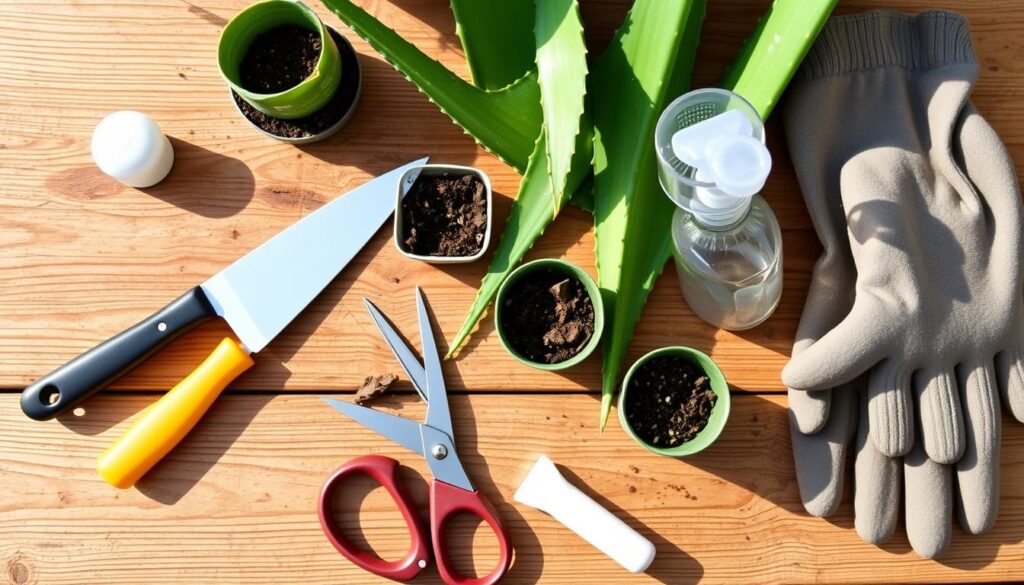
“Propagation by division is one of the most straightforward methods of creating new aloe plants from an existing one.”
Ideal Timing for Aloe Propagation
The best time to propagate aloe plants is in the spring. This is when they are most active and have the energy to grow new cuttings or divisions. Propagating in the spring increases your chances of success.
Choose a healthy parent plant without diseases or pests. Also, soak the plant a few days before propagation. A well-hydrated plant will produce healthier new growth.
Spring is the best time for aloe propagation. It ensures your cuttings or divisions have a strong chance of rooting and growing well. This is the prime season for aloe plant growth.
| Aloe Variety | Root Growth | Other Observations |
|---|---|---|
| Aloe africana | Significant root growth after 3 months | – |
| Aloe kedongensis | Less developed roots, sunburn marks | – |
| Aloe mutabilis | Vigorous root system growth | Despite being relatively small |
| Aloe dawei | Well-developed roots | Possibly due to larger size and placement |
The table shows how different aloes grow during propagation. This info helps you know the best conditions and timing for specific aloe species.
Propagate Aloe Cutting: Easy Steps for Success
Propagating aloe plants from cuttings is rewarding and saves money. It’s easy to do and can help you grow more aloe plants. Whether you’re propagating aloe leaves or rooting aloe cuttings, the key is to follow the right techniques and provide the proper care.
To begin, pick a thick, healthy, and mature leaf from your aloe plant. Use a sharp knife or pruning shears to make a clean 45-degree angle cut at the base of the leaf. Make sure the cut is as close to the stem as possible. Let the cut leaf dry for 2-4 days to form a callus. This helps prevent rot during the propagation process.
- After the cut end is calloused, you can divide the leaf into 2-4 inch cuttings. Each cutting should have a flat edge at the base.
- Dip the soil-bound end of each cutting in a rooting hormone to encourage root growth.
- Plant the cuttings in a well-draining potting mix or propagation medium, such as a mixture of soil and smart gravel.
- Water the cuttings well with a propagation promoter and place them in a bright, indirect light location.
After a few weeks, you’ll see new growth. This means the aloe cuttings have successfully rooted. Keep an eye on them, providing the right amount of water and light. Watch as they grow into thriving, new aloe plants. This simple how to propagate aloe cuttings method lets you easily multiply your aloe collection and enjoy these versatile and beautiful succulents.
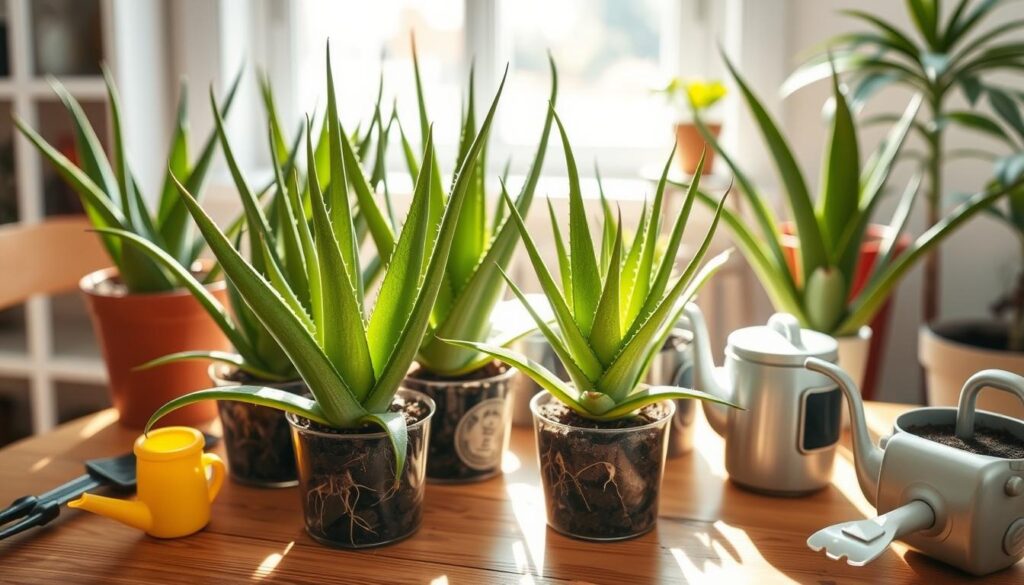
Aloe Plant Division Propagation
Dividing aloe plants is a simple and effective way to grow more of these hardy succulents. This method involves separating the offsets or “pups” that grow at the base of the mother plant. This way, you can easily create new aloe plants.
Step-by-Step Guide
To propagate aloe plants by division, follow these simple steps:
- Start by thoroughly watering the parent aloe plant. This will make it easier to remove the pups without damaging the roots.
- Gently dig around the base of the plant to expose the pups. Carefully separate them from the mother plant, ensuring each pup has intact roots.
- Allow the divided pups to sit in a dry place for a few days, allowing the cut ends to callous over and prevent rot.
- Plant the pups in a well-draining soil mix, such as a cactus or succulent soil, and add some smart gravel to improve drainage.
- Water the newly planted pups lightly, and consider using a propagation promoter to encourage root growth.
- Within a month, you should start to see new growth, indicating a successful division.
Dividing aloe plants is a great way to propagate aloe by division. It lets you create more plants from the mother plant’s offsets. This method is especially useful for dividing aloe plants that are too crowded in their containers. It helps promote the health and growth of your aloe collection.
“Propagating aloe plants through division is a rewarding process that allows you to share these versatile succulents with friends and family.”
Aloe Pup Propagation
Aloe vera plants are known for their ability to grow new plants from offsets, or “pups.” These pups grow from the base of the parent plant as it ages. This makes it easy to create more aloe plants.
Look for pups that are 4-6 inches tall. They have a strong root system. Dig up the parent plant to get to the pups. Use your hands or a clean knife to remove them, keeping the roots intact. Let the divided pups dry for a few days before planting them in their own pots.
The new plants will grow quickly. Wait until the pups are 3–4 inches tall with several leaves before separating them. Pups without roots need 24 to 48 hours in a cool, dark spot to form calluses before planting.
| Propagation Method | Time to Rooting | Success Rate |
|---|---|---|
| Aloe Pups | 4-6 weeks | Highest |
| Aloe Leaf Cuttings | 3-4 weeks | Moderate |
| Aloe Seeds | 2-4 weeks | Lowest |
Propagating aloe pups is the easiest and most successful method. It’s simpler than using seeds or leaf cuttings. By following these steps, you can easily grow new aloe plants from pups and expand your collection.
“Aloe pups are a wonderful way to propagate more aloe plants without the hassle of seeds or cuttings. They’re practically ready-to-go plants!”
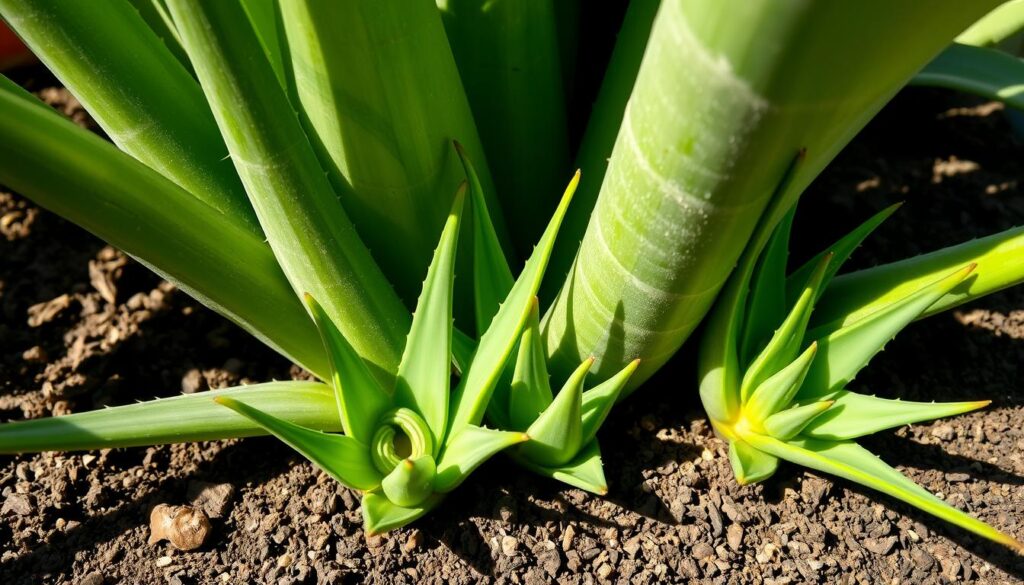
Caring for Newly Propagated Aloe Plants
Congratulations on successfully propagating your new aloe plants! Now, it’s time to care for your young aloe pups and cuttings. To help them thrive, focus on light, position, and watering.
Light and Position
Newly propagated aloe plants need bright, indirect sunlight. Start them in a spot with plenty of light but not direct sunlight. This prevents scorching.
As they grow, slowly introduce them to more direct sunlight. This helps them adjust and prevents stress.
Watering
Proper watering is key for your new aloe plants. Let the soil dry before watering again to avoid root rot. Adjust the watering as the plants grow.
Using a propagation promoter in your watering can also help. It supports the new plants’ growth and development.
With the right light and careful watering, your aloe plants will thrive. With patience and attention, they’ll soon join your aloe vera collection.
“Aloe vera is one of the most widely sold succulents globally, with high occurrence rates in homes and gardens.”
Troubleshooting Common Propagation Issues
Propagating aloe plants is usually easy, but some problems can happen. Overwatering is a big one, causing rot and death of your new aloe cuttings. Make sure the soil is dry before watering again.
Not enough lighting can also slow down your aloe plants. Give them bright, indirect sunlight for at least 6 hours a day. Without enough light, they can grow weak and unhealthy.
- Pests and diseases can also trouble your aloe plants. Check for pest infestations or disease like leaf spots or fungal infections. Fix any problems fast to keep your aloe plants healthy.
- Root rot is another issue, often from too much water or poor drainage. Make sure your pots drain well and don’t keep the soil too wet.
Stay alert and fix problems quickly to keep your aloe plants thriving. With the right care, your aloe propagation will succeed.
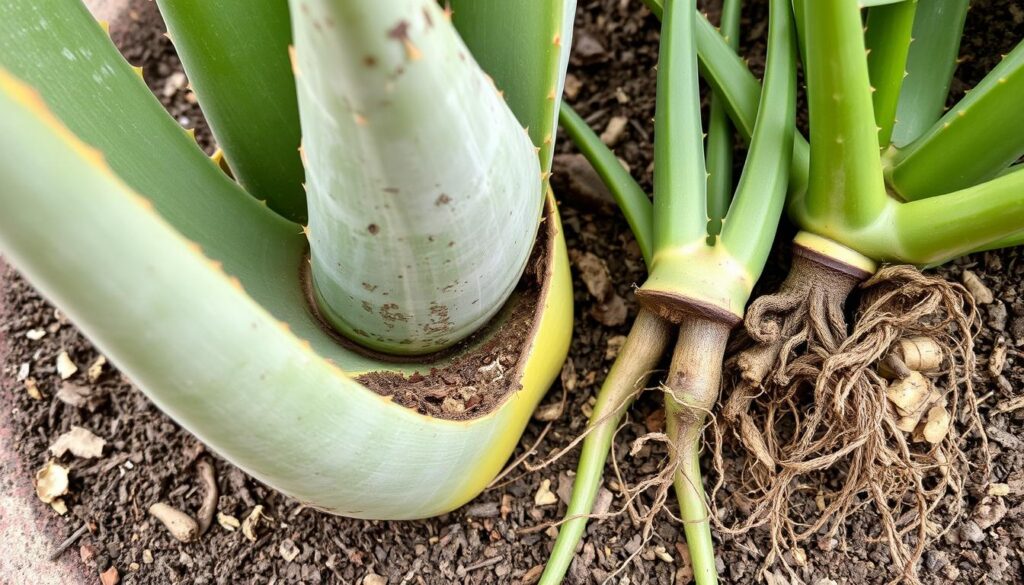
“Patience and diligence are key when propagating aloe plants. By addressing any issues promptly, you can ensure the long-term success of your propagated aloe cuttings and offsets.”
Maximizing Aloe Plant Growth
Fertilizing Propagated Aloe Plants
Aloe plants need the right food to grow strong and healthy. A balanced liquid plant food or houseplant multivitamin can help. Add it to your regular watering to support the new plants.
Follow the fertilizer instructions carefully. Too much can harm your plants. With proper care, your aloe plants will flourish.
Here are some tips to help your aloe plants grow:
- Choose a balanced, water-soluble fertilizer for succulents and cacti.
- Fertilize every 2-3 weeks in spring and summer.
- Use half the recommended strength to prevent over-feeding.
- Don’t fertilize in winter when plants grow slower.
By fertilizing propagated aloe plants right, they will thrive and grow well.
Conclusion
Propagating aloe plants is a rewarding journey. It lets you grow your own collection of these versatile succulents. You can propagate from cuttings, divisions, pups, or even seeds.
Following the proper techniques and providing the right care is key. This ensures your aloe plants thrive after being propagated. Understanding the ideal timing, necessary tools and materials, and best practices for each method is crucial.
With patience and attention, you’ll soon have a thriving assortment of aloe plants. These plants offer medicinal, aesthetic, and practical benefits. Don’t be afraid to share your propagated aloe plants with friends and family.
The $13 billion aloe vera market is growing fast. It’s expected to increase by 35-40% in the next 5 years. This shows the demand for this amazing plant.
As you continue your aloe propagation journey, remember the importance of proper techniques, timing, and care. By applying the strategies outlined in this article, you can ensure successful aloe plant propagation. You’ll delight in growing more aloe plants to share with those around you.
